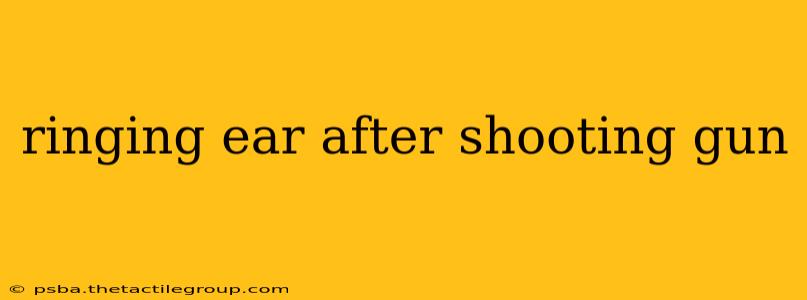Shooting guns, whether for sport, hunting, or self-defense, can expose you to dangerously loud noises. Many shooters experience temporary or even permanent ringing in their ears, medically known as tinnitus, after firing a weapon. Understanding the causes, risks, and preventative measures is crucial for protecting your hearing.
The Science Behind the Ringing
The intense sound generated by firearms far exceeds safe noise levels. These sounds create pressure waves that directly impact the delicate structures within your inner ear. The hair cells in your cochlea, responsible for transmitting sound signals to your brain, are particularly vulnerable. Exposure to loud noises can damage or destroy these cells, leading to hearing loss and tinnitus. The ringing you experience is the result of this damage, with your brain misinterpreting the irregular signals from the injured hair cells.
Factors Influencing Hearing Damage
Several factors influence the severity of hearing damage after shooting:
- Type of firearm: Larger caliber weapons and those with less effective muzzle brakes generally produce louder reports.
- Distance from the firearm: The closer you are to the gun when it fires, the higher the noise exposure.
- Duration of exposure: Firing multiple rounds in succession without breaks increases the risk of cumulative damage.
- Hearing protection: The most significant factor determining whether you experience hearing damage is the use (or lack thereof) of adequate hearing protection.
Recognizing the Symptoms
Tinnitus manifests differently for each person, but common symptoms after shooting include:
- Ringing, buzzing, hissing, clicking, or whistling in one or both ears. This can be intermittent or constant.
- Temporary or permanent hearing loss. You might notice difficulty understanding speech, especially in noisy environments.
- Feeling of fullness or pressure in the ears.
- Sensitivity to loud noises.
If you experience any of these symptoms after shooting, seek medical attention immediately. Early diagnosis and treatment can help prevent long-term hearing problems.
Preventing Hearing Damage: Essential Safety Measures
Protecting your hearing is paramount. Always prioritize these safety measures:
1. Wear Hearing Protection:
This is the most crucial step. Use high-quality hearing protection, such as:
- Electronic earmuffs: These amplify normal sounds while suppressing loud noises, allowing for communication while still protecting your hearing.
- Foam earplugs: These provide a significant noise reduction and are readily available. Ensure they are inserted properly for optimal protection.
- Custom-molded earplugs: These offer the best fit and noise reduction.
Never shoot a firearm without proper hearing protection.
2. Maintain Safe Distances:
Avoid being too close to the firearm when it's discharged.
3. Limit Exposure:
Take breaks between shooting sessions to allow your ears to recover.
4. Regular Hearing Checkups:
Schedule regular hearing checkups with an audiologist, especially if you frequently engage in shooting activities. Early detection of hearing loss can lead to more effective treatment.
Seeking Professional Help
If you experience tinnitus or hearing loss after shooting, consult an audiologist or ENT specialist. They can conduct a thorough hearing evaluation to determine the extent of the damage and recommend appropriate treatment options. Early intervention is key to minimizing the long-term effects of noise-induced hearing loss. Don't ignore the ringing – it's a warning sign that needs immediate attention.

